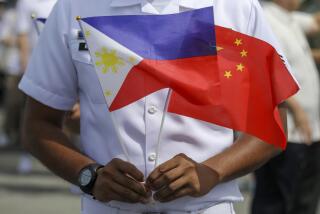U.N. Gets OK on Protecting Somali Aid
- Share via
NAIROBI, Kenya — U.N. officials said Wednesday they have reached a “momentous” agreement with a key Somali warlord allowing the deployment of up to 500 armed foreign troops to protect relief shipments coming into the port of Mogadishu.
Plagued by violence and looting, the port is a troublesome bottleneck for emergency food and medical supplies for Somalia’s more than 6 million people, as many as 1.5 million of whom face famine after years of civil war and drought.
The agreement with Gen. Mohamed Farah Aidid, a rebel commander who exerts control over the portion of Mogadishu that includes the port, the international airport and many storage depots, was announced here by Mohammed Sahnoun, special representative to Somalia for U.N. Secretary General Boutros Boutros-Ghali.
“Certainly this very important development will help resolve the security questions which we were facing in Mogadishu,” Sahnoun said at a press conference, “and will certainly bring, in a speedy way, the food to the needy.”
The deployment of troops still requires final approval of the U.N. Security Council, but the council has approved it in principle in two previous resolutions. Depending on council action and logistical considerations, the first troops could arrive in two or three weeks.
Sahnoun said he hopes the agreement will encourage Western countries to step up their contributions to Somalia, which so far this year have fallen far short of the desperate country’s needs.
Since January, less than 90,000 tons of relief food has reached the country, which Sahnoun called “only 25% of the minimum required--and I stress the word minimum. “ U.N. and relief agency estimates place the country’s needs at about 50,000 tons a month.
The crisis in provincial areas has increased in recent weeks, he said, as people emerge from the bush on hearing rumors of food shipments and gather in makeshift feeding centers. In the town of Bardera, about 160 miles west of Mogadishu, 200 people a day have come since last week, when the U.N. Children’s Fund landed its first relief flight there in months.
U.N. officials and relief workers in Mogadishu have long felt that the intervention of an international armed force is the only way to stem the security crisis in the city, an anarchic former capital teeming with guns and artillery. But many felt that 500 troops would be insufficient, especially if Gen. Aidid chose to oppose them with force. Recent proposals called for 2,000 troops in Mogadishu alone, with a further 4,000 deployed around the country.
But Sahnoun said he thinks 500 would be enough for Mogadishu--”if we don’t have to deal with a hostile environment.” Deployment of troops elsewhere would require further talks with other commanders controlling Somali territory.
Aidid has opposed international intervention in Somalia on grounds that an armed force would violate Somali sovereignty. But because the country has been ungoverned and virtually ungovernable since the January, 1991, ouster of long-term strongman Mohamed Siad Barre, most observers argue that Aidid is more concerned that he would be among the big losers of authority if a cohesive foreign force arrived in Mogadishu.
Even Aidid’s agreement to admit a relatively small U.N. force carries unknown weight, as many of the tens of thousands of gunmen in the city owe him minimal allegiance. “In south Mogadishu alone, there are three powerful clans other than Aidid’s, and while they’re aligned with him, they don’t fully respect him,” a U.N. official said in a recent interview in Mogadishu.
Sahnoun acknowledged that Aidid, like most other Somali commanders, “has problems with his troops. No one can claim he has total control.”
For all that, Sahnoun was careful to stress that the 500 U.N. guards would have a restricted assignment: protecting supplies at the port and airport and escorting them to their final destinations in the city of Mogadishu.
“They will be there for the security of humanitarian supplies,” he said. “This is not a peacekeeping force.”
The U.N. Charter ordinarily allows the international body to dispatch troops into a country only with the agreement of the host government or in cases of a “threat to international peace and security.” Because there is no functioning government in Somalia--its self-declared “interim president,” Ali Mahdi Mohamed, controls only about one-fourth of Mogadishu--a July 28 Security Council resolution laid the groundwork for troops by finding that “the situation in Somalia constitutes a threat to international peace and security.”
More to Read
Sign up for Essential California
The most important California stories and recommendations in your inbox every morning.
You may occasionally receive promotional content from the Los Angeles Times.










